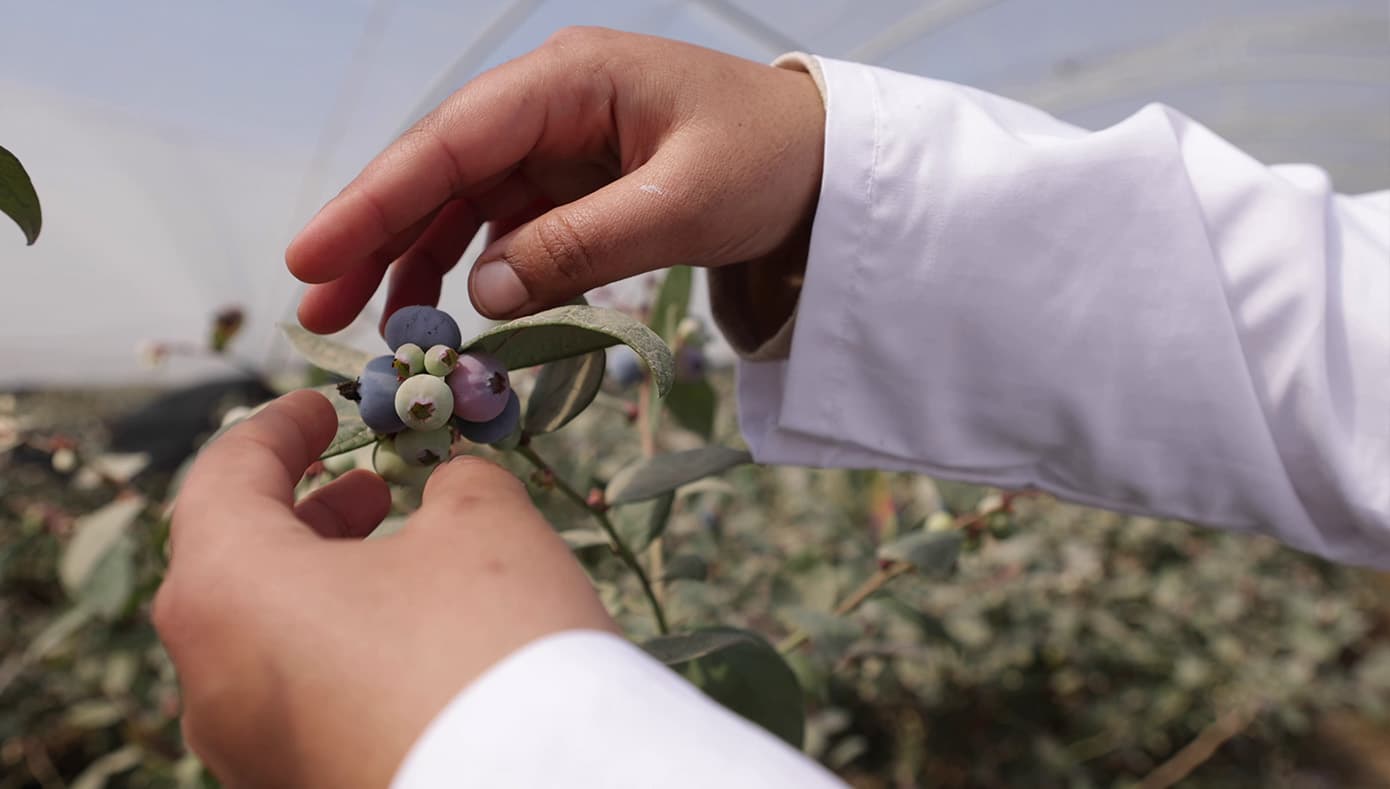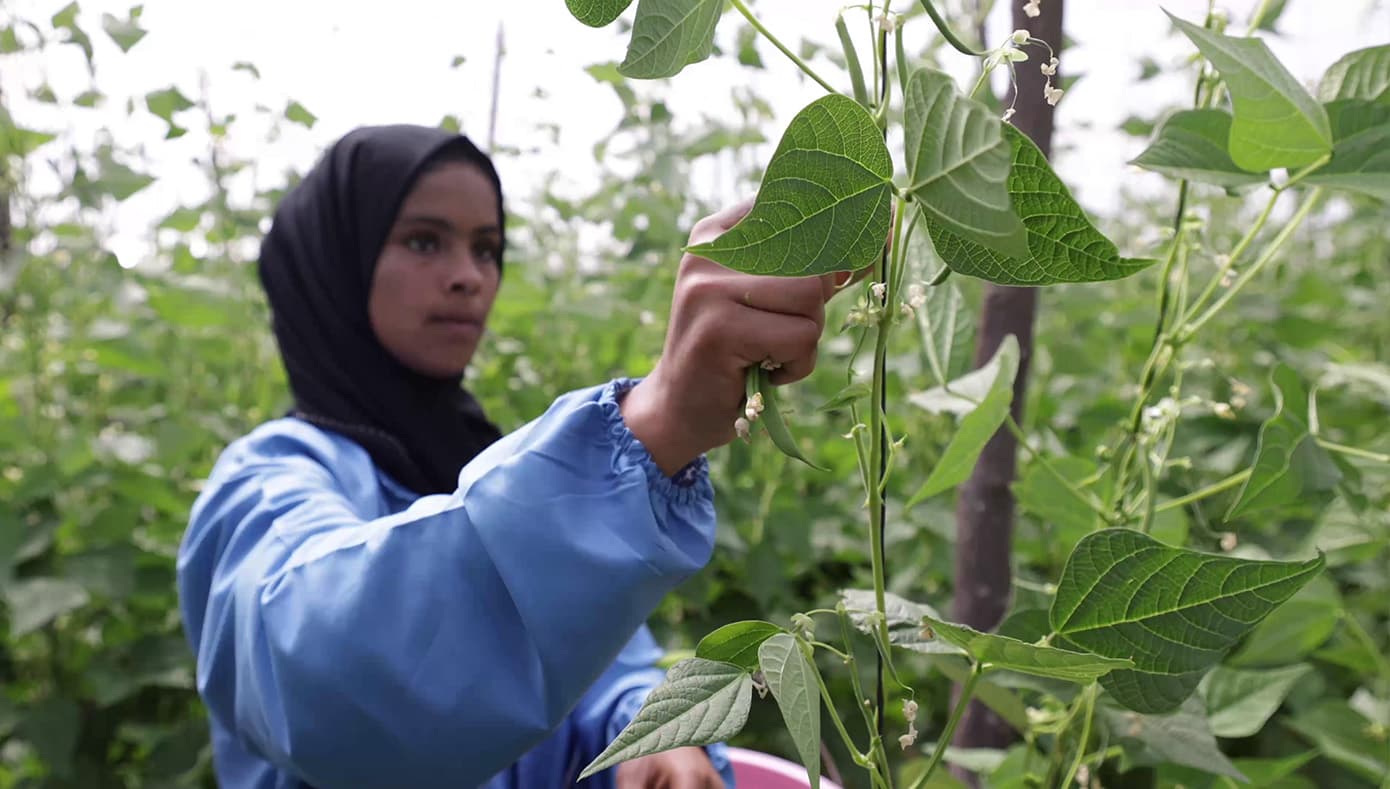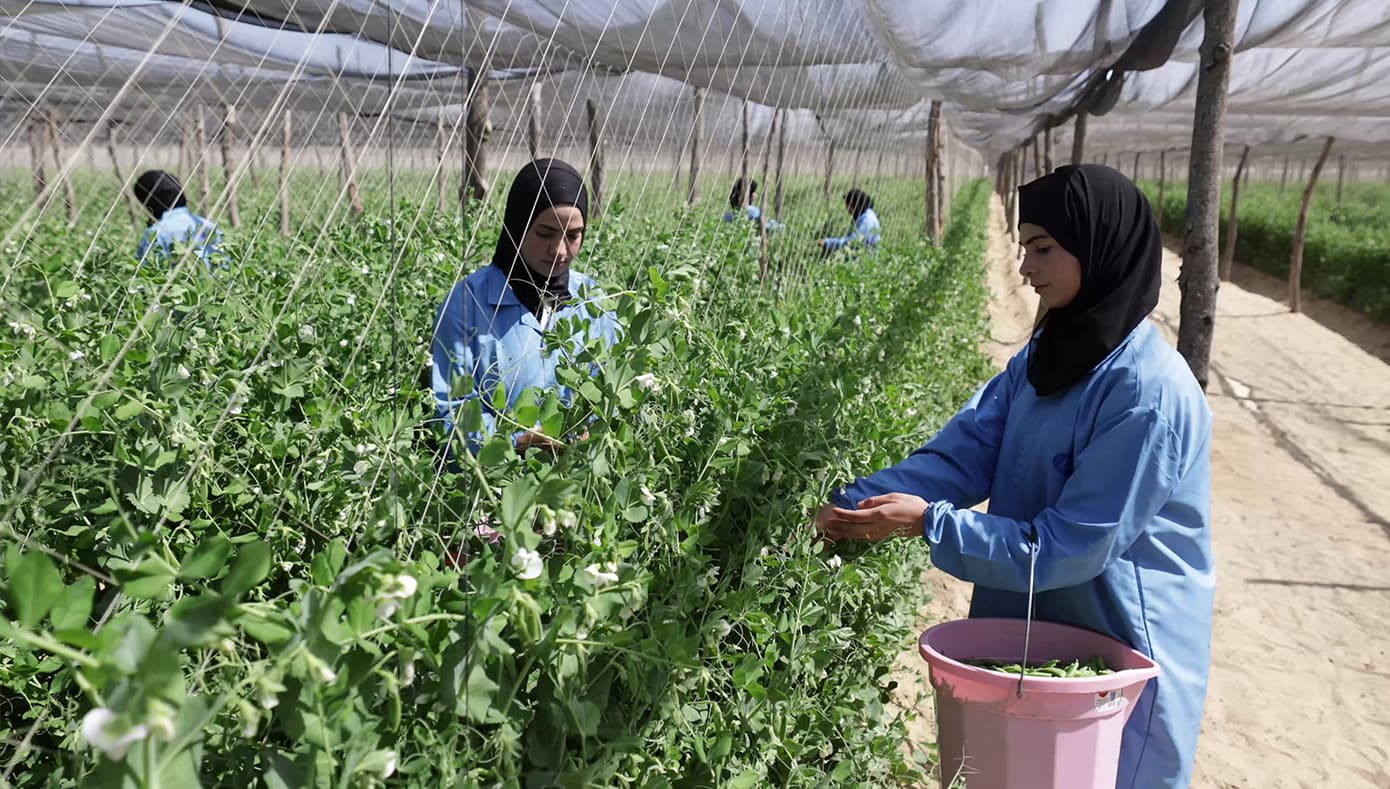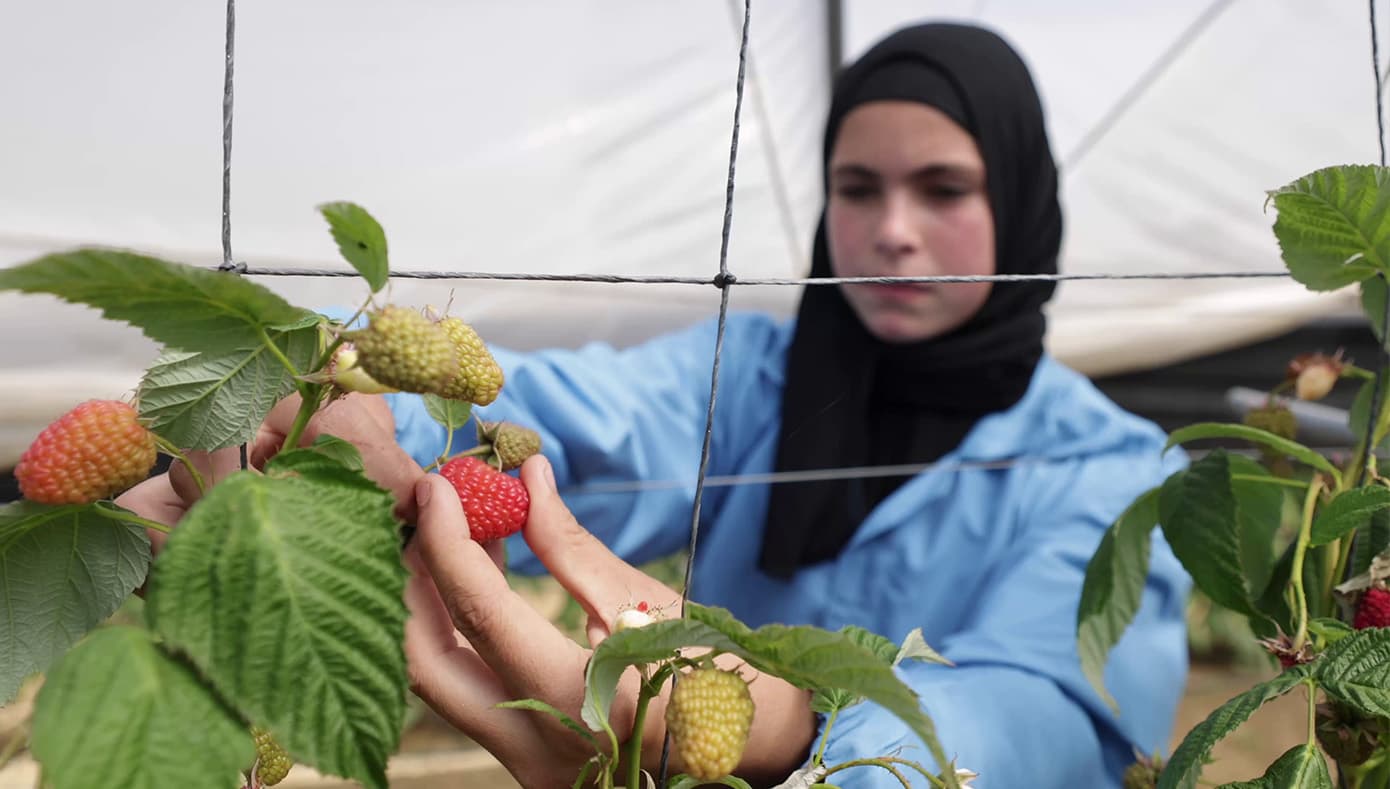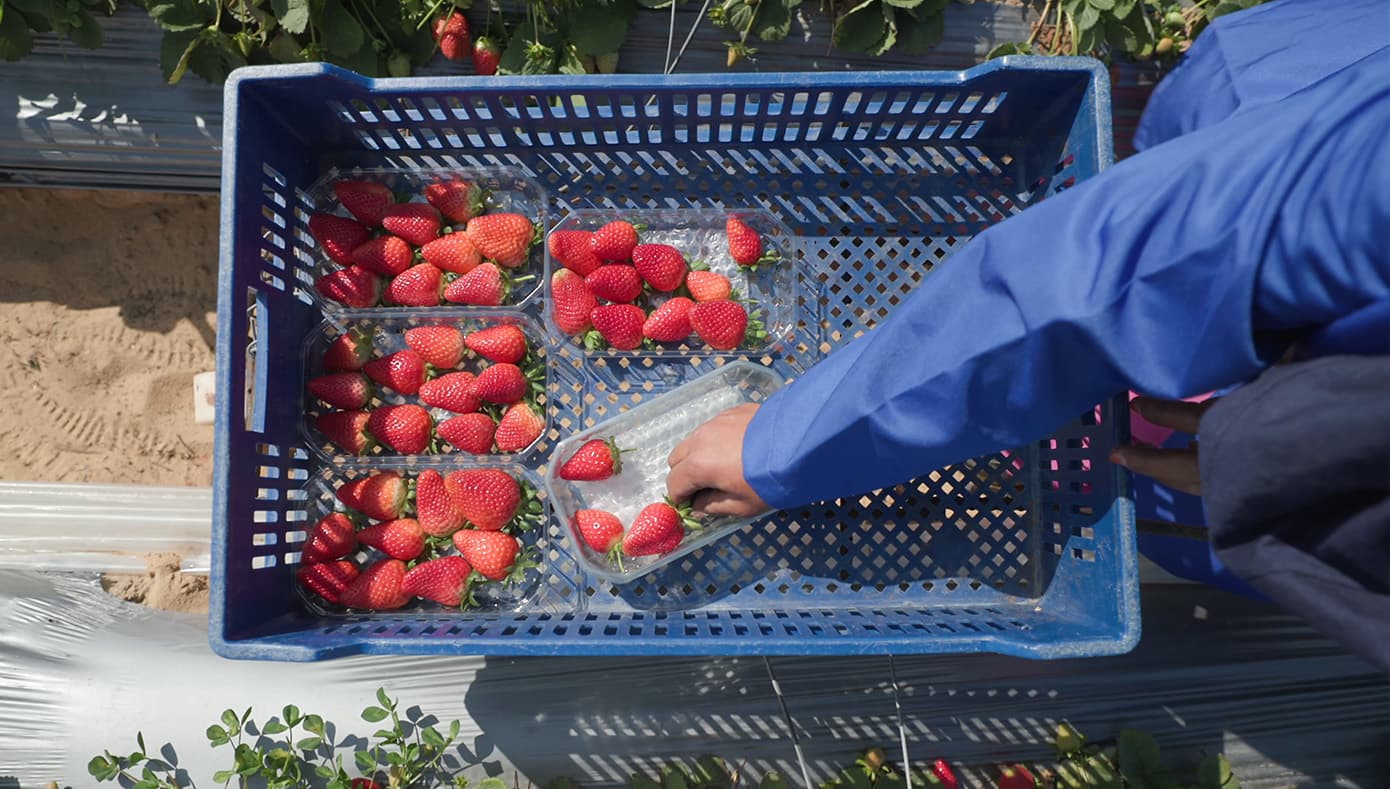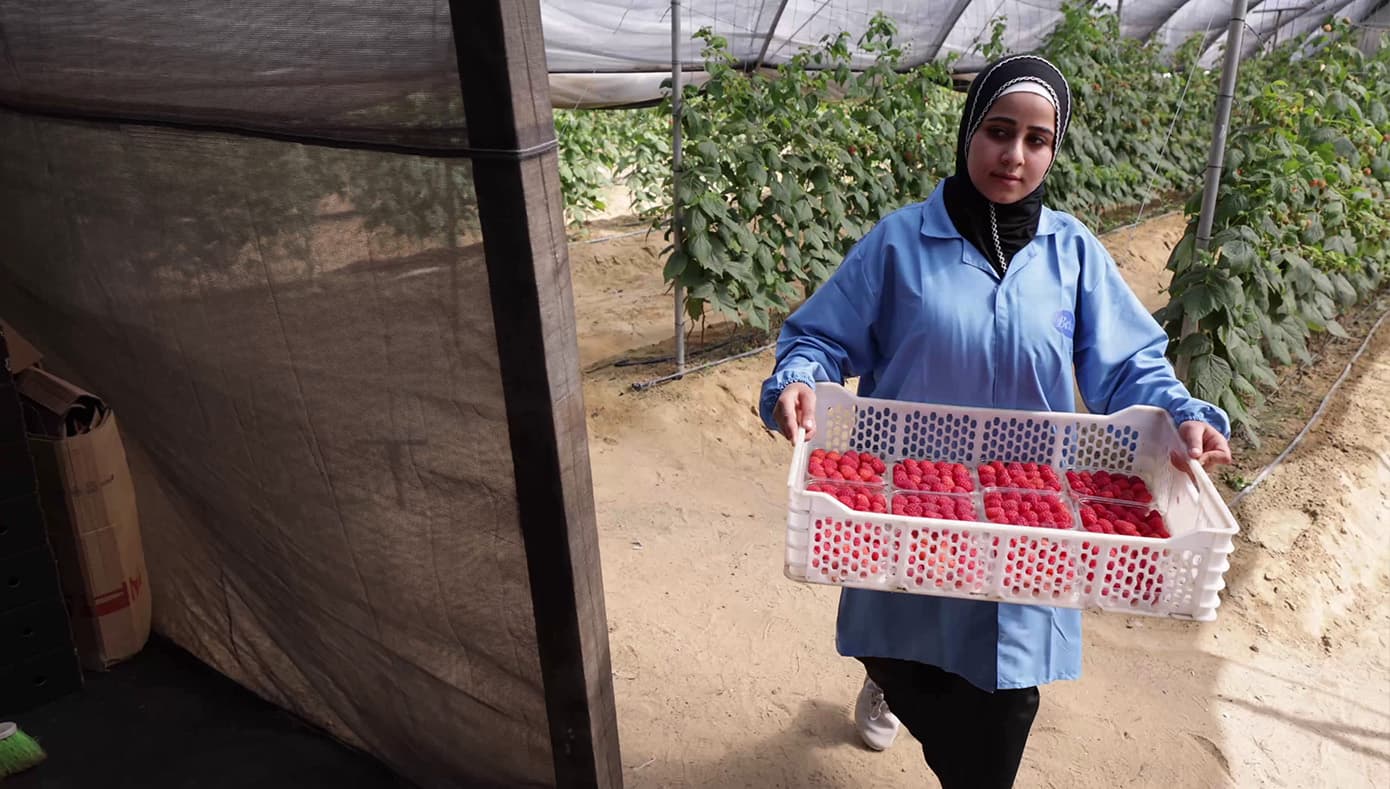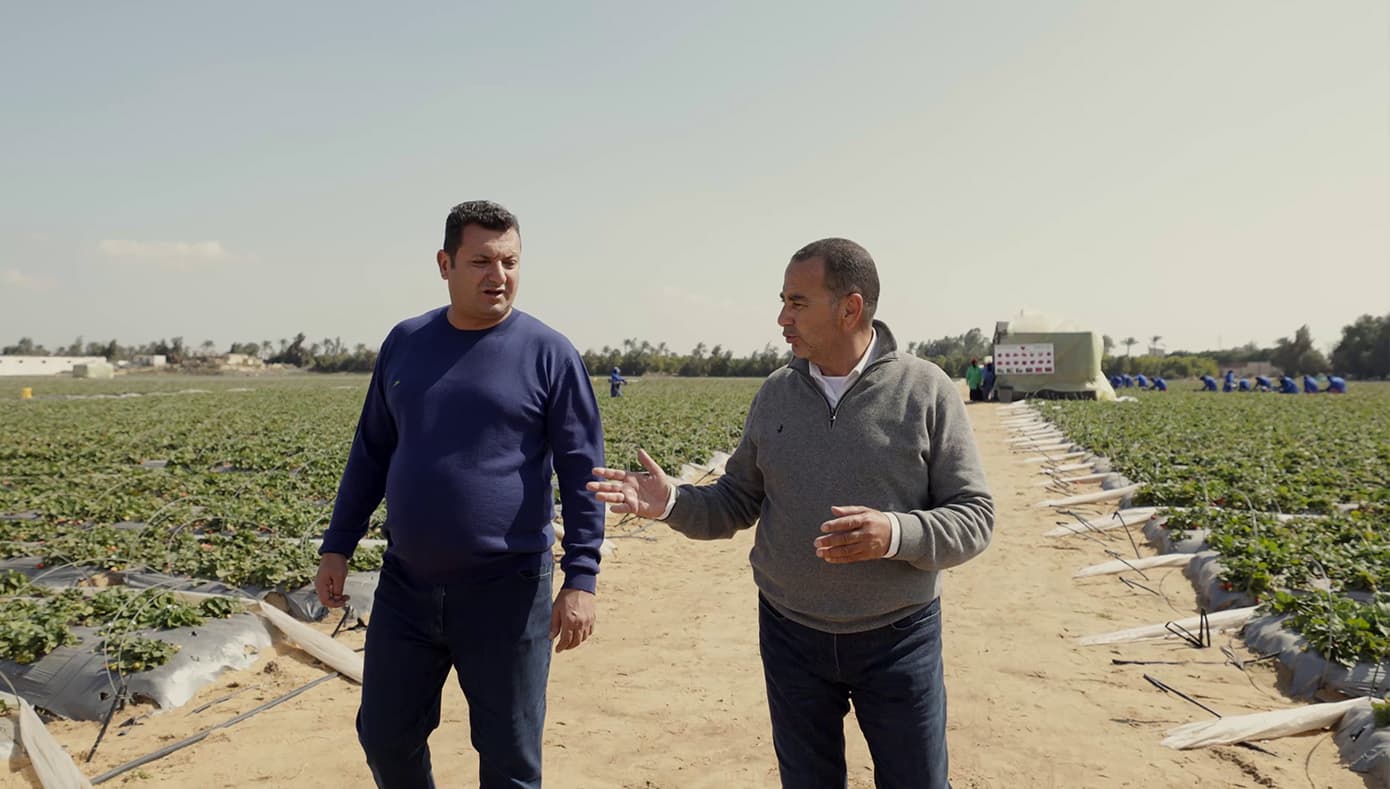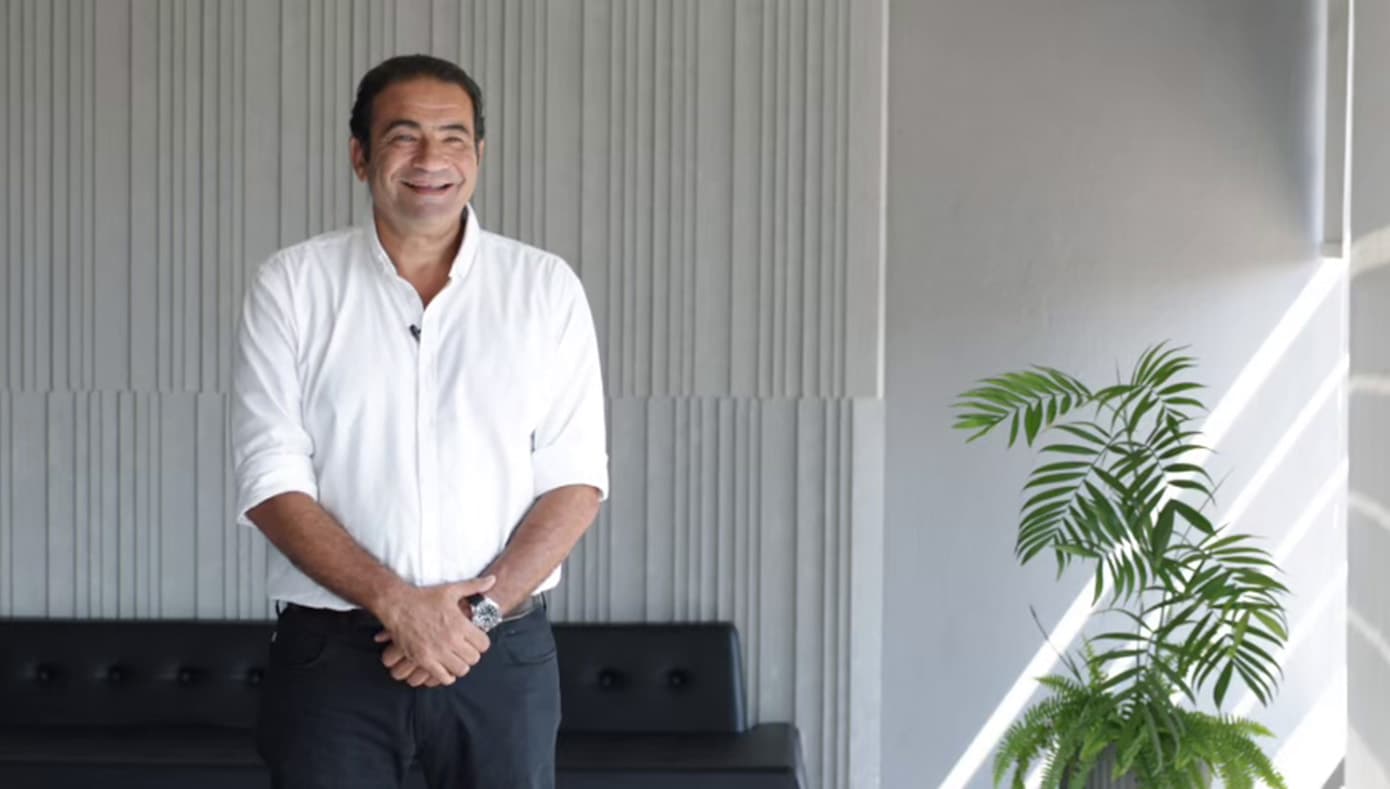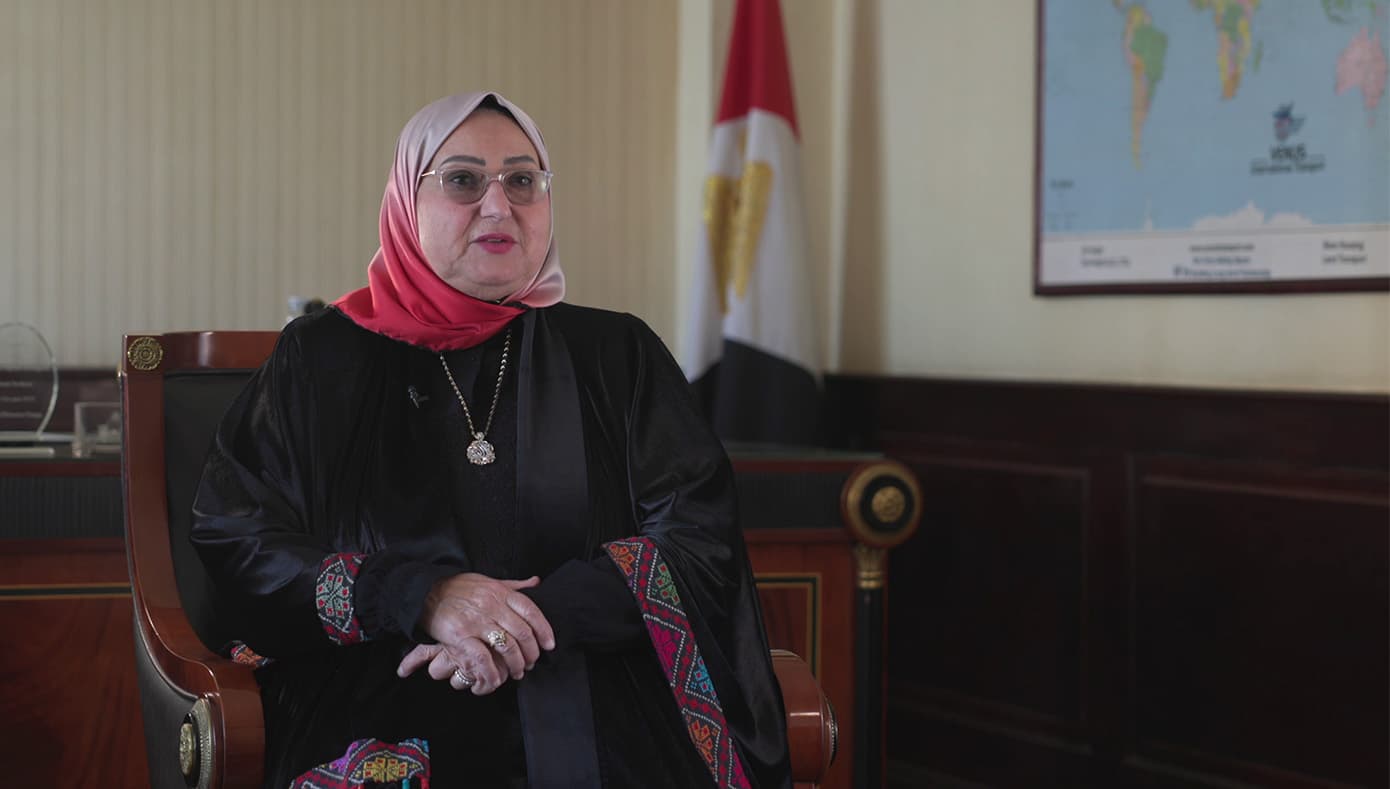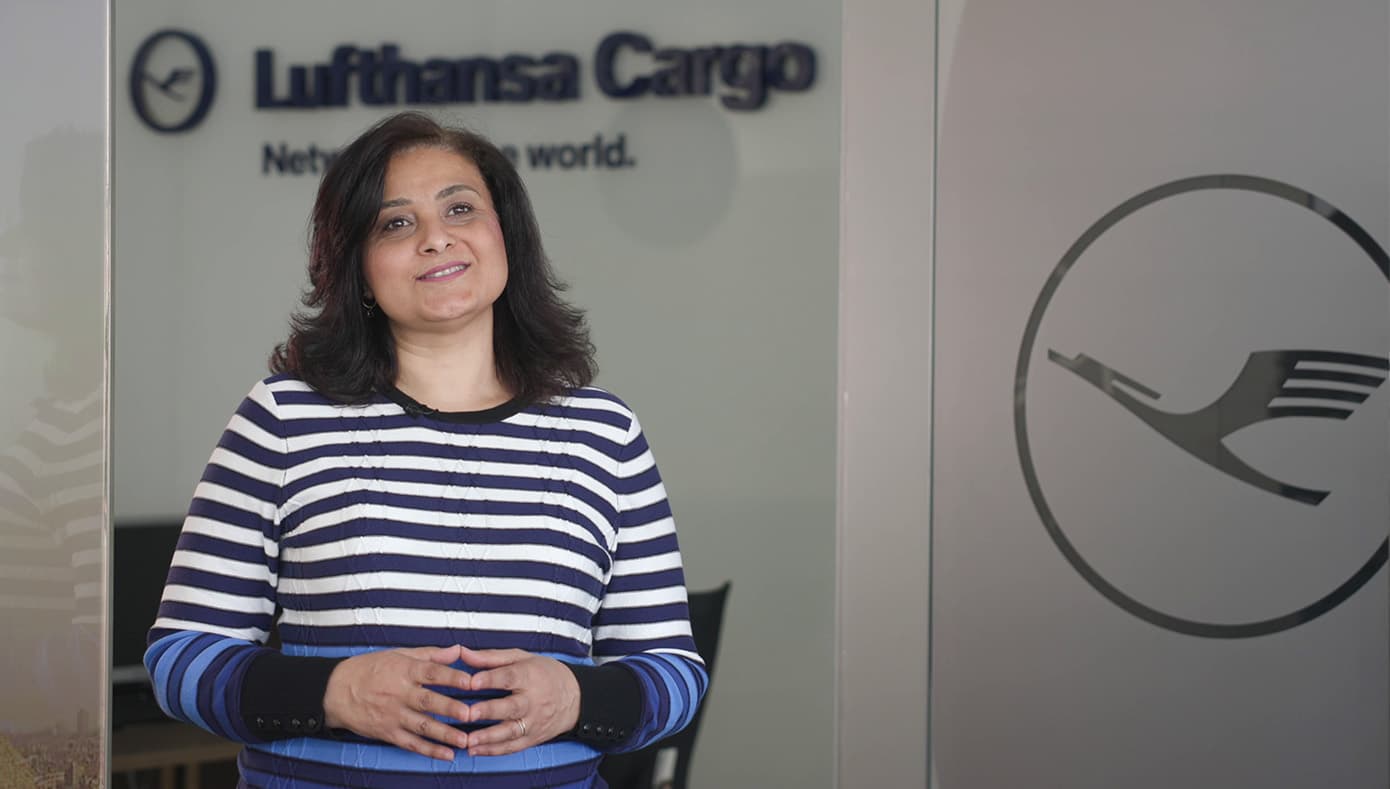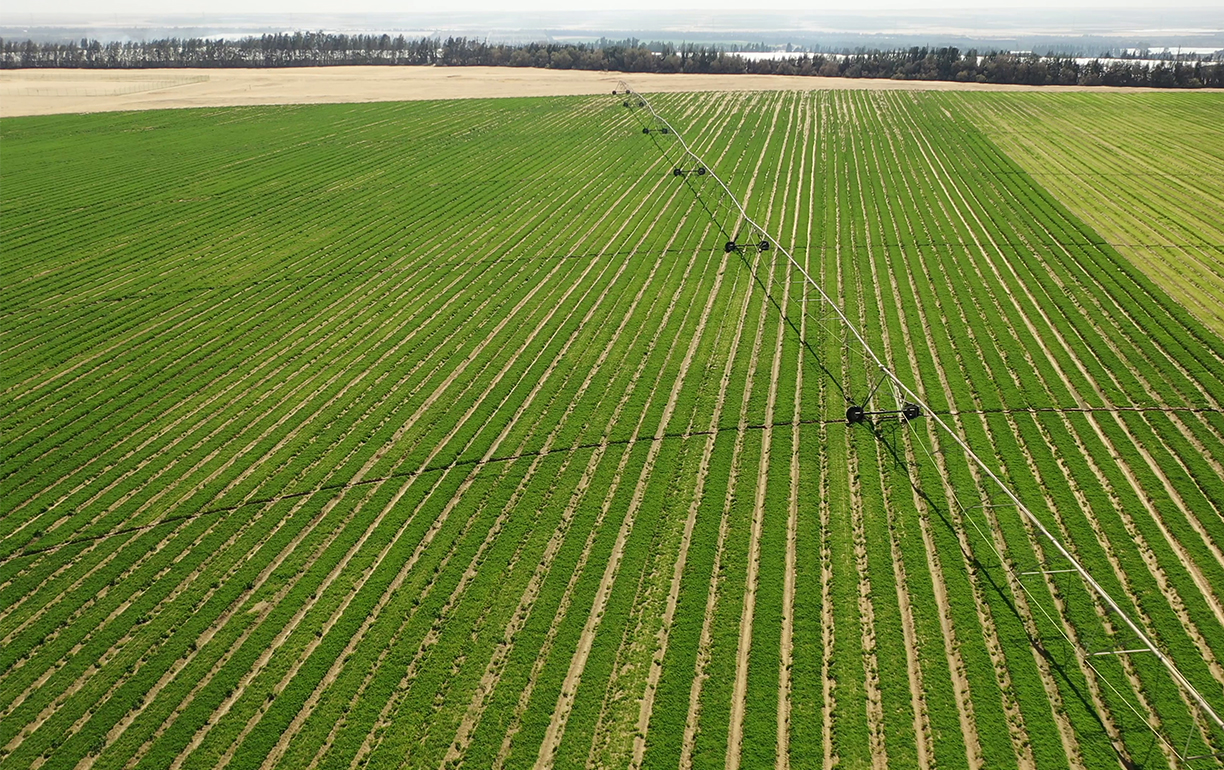
Green desert - Egypt's sustainable agriculture takes off.
From fertile oases to efficient airfreight - Egypt's agriculture is booming and focuses on sustainability. Find out how Lufthansa Cargo is supporting the green movement and reducing CO2 emissions to transport fruit and vegetables.
You can watch this project also on the YouTube channel of Lufthansa Cargo.
Green fields as far as the eye can see. A few miles further on, the desert begins. But the Nile - at 6671 km the longest river in the world - transforms the areas near the river and especially the 24,000 square kilometer Nile Delta into a fertile oasis. The conditions here are ideal for the growth of many plants. Plenty of sunshine, fertile soils, experienced agronomists and clever agricultural practices allow the plants to grow better than in many other countries. A field planted with wheat in Egypt, for example, produces 2.9 tons of grain, compared to 1.5 tons in many other countries.
Egyptians take advantage of these benefits and agriculture makes up a large part of the economy. Agriculture not only contributes to the 15% of gross domestic product, but also employs 28% of the country's workforce, and in Upper Egypt even more than 50%. And the trend is rising. A growth rate of 10% per year is currently forecasted for the coming years. However, the industry plays a key role not only for the country itself, but also for exports to other countries and the production of food worldwide.
The Egyptian government is not only aware of the importance of the industrial sector, but also of the importance of sustainability. And Egypt wants to push ahead with sustainable measures. The Minister of Agriculture, El-Sayed El-Quseir, has a clear vision of Egypt's sustainable agricultural development by 2030. The government is providing targeted support to the sector with low-interest loans for farmers, digitization, and expansion projects to create greater self-sufficiency in strategic crops, increase the competitiveness of Egypt's agricultural exports, minimize the impact of climate change on the agricultural sector and support integrated agricultural and rural communities. A visit to three of the many farms in Egypt confirms these goals and leaves you impressed.
|
Green fields as far as the eye can see. A few miles further on, the desert begins. But the Nile - at 6671 km the longest river in the world - transforms the areas near the river and especially the 24,000 square kilometer Nile Delta into a fertile oasis. The conditions here are ideal for the growth of many plants. Plenty of sunshine, fertile soils, experienced agronomists and clever agricultural practices allow the plants to grow better than in many other countries. A field planted with wheat in Egypt, for example, produces 2.9 tons of grain, compared to 1.5 tons in many other countries. |
The Egyptian government is not only aware of the importance of the industrial sector, but also of the importance of sustainability. And Egypt wants to push ahead with sustainable measures. The Minister of Agriculture, El-Sayed El-Quseir, has a clear vision of Egypt's sustainable agricultural development by 2030. The government is providing targeted support to the sector with low-interest loans for farmers, digitization, and expansion projects to create greater self-sufficiency in strategic crops, increase the competitiveness of Egypt's agricultural exports, minimize the impact of climate change on the agricultural sector and support integrated agricultural and rural communities. A visit to three of the many farms in Egypt confirms these goals and leaves you impressed.
|
The Belco Farm is located an hour's drive north-west of Cairo. Belco has been producing fruit and vegetables in the Nile Delta since the 1960s. In 1993, the brothers Sherif and Mohsen El-Beltagy took over and continued to expand the farm. Belco now grows for example grapes, beans, spring onions, peas, strawberries, raspberries, blueberries, sweet potatoes and tenderstem broccoli on over 3,000 acres of land. "In addition to our farmland, we also own three packing houses and produce around 15,000 tons of fruit and vegetables a year, mainly for Europe, but also for Africa, Asia and the Middle East," says Sherif El-Beltagy proudly. "Our core values include innovation and sustainability. We persistently invest in our infrastructure, and technological and agricultural capabilities to support both our employees and the surrounding communities and to protect the environment."
Between high bush beans and harvest workers carefully picking raspberries, the Managing Director's words are impressively brought to life. Mohamed Gad, Research & Development Manager at Belco, leads us through rows of Adelita, a raspberry variety that is very well suited for cultivation in Egypt. "Sustainability starts with the selection of the variety," reports Mohamed. "We choose plant species and varieties that achieve the best harvest results in our specific environment, for example with the warm weather. Our irrigation and collection systems make optimum use of every drop of water." When it comes to the environment and biodiversity, he bursts with knowledge. "Of course, we pay attention to crop rotations, such as sweet potatoes first, followed by peas or beans and then spring onions, in order to protect the organic matter in the soil as much as possible. But for us, these are the basics of sustainable agriculture." Things get much more detailed when it comes to pest control. "The use of pesticides is the very last thing we do. Before that, there are dozens of other ways to keep pests away or control them. The most effective measures are actually taken to prevent pest infestations. If an infestation does occur, for example by the well-known and feared red mite, we use persimilis - also known as predatory mites. These are beneficial insects that first eat the red mites and then themselves. This biological control is very effective, does not harm the environment and the pests cannot develop resistance to it, as is the case with some pesticides, for example." The impact on the environment concerns the agronomist in every aspect of production. For example, if the trees are cut on the farm, the wood is used for constructions in the fields. No structures or materials may be used that could injure or even disturb birds during migration. "Of course, we also have to keep the odd rodent away from our farms. But we can only achieve this with measures that do not harm any animals. None of our measures must harm wildlife."
|
The Belco Farm is located an hour's drive north-west of Cairo. Belco has been producing fruit and vegetables in the Nile Delta since the 1960s. In 1993, the brothers Sherif and Mohsen El-Beltagy took over and continued to expand the farm. Belco now grows for example grapes, beans, spring onions, peas, strawberries, raspberries, blueberries, sweet potatoes and tenderstem broccoli on over 3,000 acres of land. "In addition to our farmland, we also own three packing houses and produce around 15,000 tons of fruit and vegetables a year, mainly for Europe, but also for Africa, Asia and the Middle East," says Sherif El-Beltagy proudly. "Our core values include innovation and sustainability. We persistently invest in our infrastructure, and technological and agricultural capabilities to support both our employees and the surrounding communities and to protect the environment." Between high bush beans and harvest workers carefully picking raspberries, the Managing Director's words are impressively brought to life. Mohamed Gad, Research & Development Manager at Belco, leads us through rows of Adelita, a raspberry variety that is very well suited for cultivation in Egypt. "Sustainability starts with the selection of the variety," reports Mohamed. "We choose plant species and varieties that achieve the best harvest results in our specific environment, for example with the warm weather. Our irrigation and collection systems make optimum use of every drop of water." |
When it comes to the environment and biodiversity, he bursts with knowledge. "Of course, we pay attention to crop rotations, such as sweet potatoes first, followed by Peas or Beans and then Spring onions, in order to protect the organic matter in the soil as much as possible. But for us, these are the basics of sustainable agriculture." Things get much more detailed when it comes to pest control. "The use of pesticides is the very last thing we do. Before that, there are dozens of other ways to keep pests away or control them. The most effective measures are actually taken to prevent pest infestations. If an infestation does occur, for example by the well-known and feared red mite, we use persimilis - also known as predatory mites. These are beneficial insects that first eat the red mites and then themselves. This biological control is very effective, does not harm the environment and the pests cannot develop resistance to it, as is the case with some pesticides, for example." The impact on the environment concerns the agronomist in every aspect of production. For example, if the trees are cut on the farm, the wood is used for constructions in the fields. No structures or materials may be used that could disturb or even injure birds during migration. "Of course, we also have to keep the odd rodent away from our farms. But we can only achieve this with measures that do not harm any animals. None of our measures must harm wildlife."
|
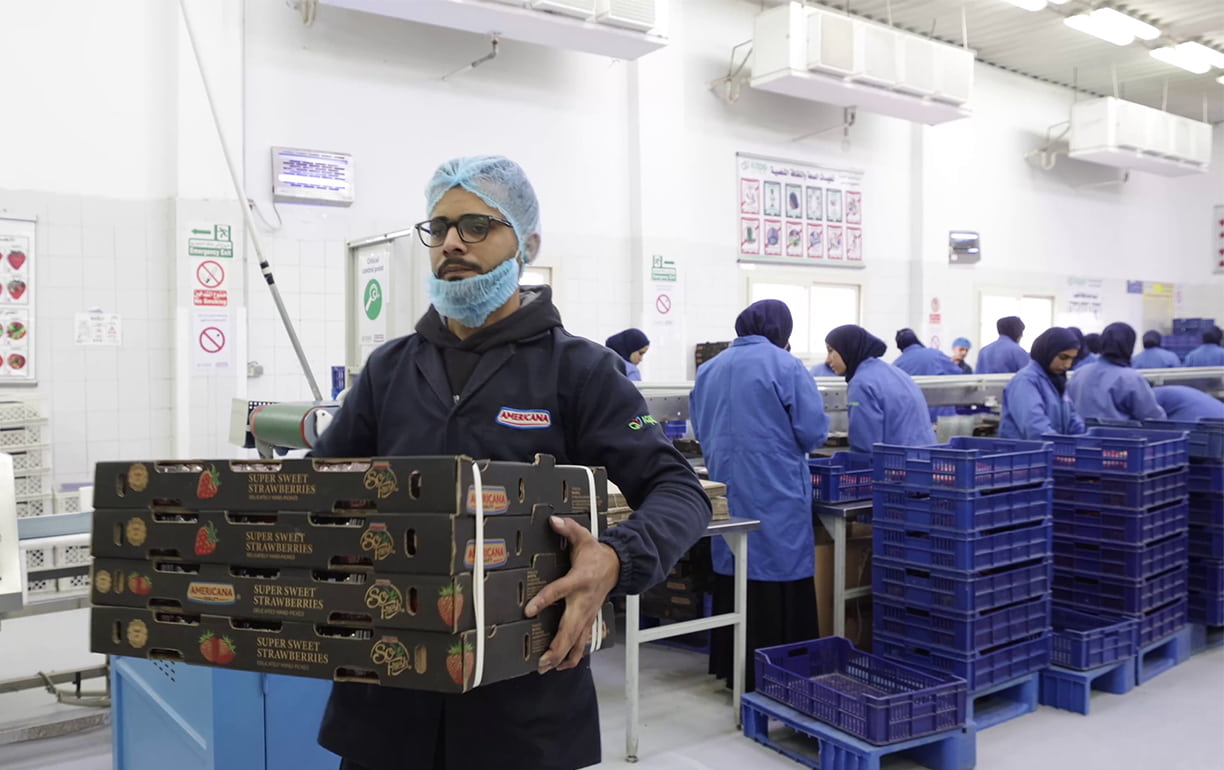
Sustainable measures are also evident during processing in the packing house. The workers carefully cut the green of the spring onions to length and the ends of the beans are also shortened. "We adapt our production to the preferences of our customers. In France and England, the extra-fine beans are currently particularly popular and are often bought already trimmed," reports Mohamed. It might seem obvious to criticize the picky Europeans with their specific ideas about vegetables, but Mohamed disagrees directly. "We see things differently here. On the one hand, our employees here can earn money by cutting off the ends, for example. And while these ends would probably end up in the garbage can in private households, nothing is thrown away here. The cut plant parts are either dried and used in seasoning mixtures, as animal feed or as a component of fertilizer. We always try to implement the customers' wishes in such a way that everyone can benefit from them."
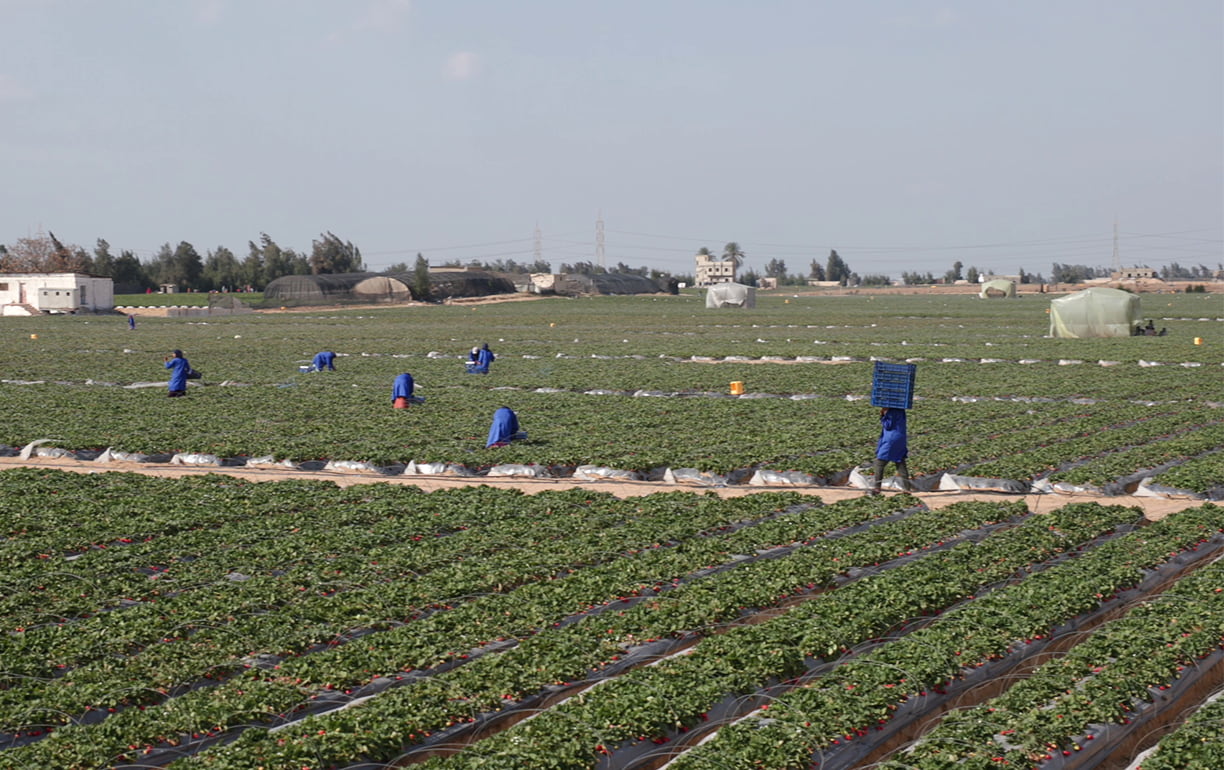
East of Cairo is another farm specialized on strawberries. In addition to strawberries, corn, broccoli, spinach, and much more is grown on 4,000 hectares. "Our fields are located in one of the most fertile agricultural regions in the world and provide an ideal environment for the around 45,000 tons of fruit and vegetables that our fields grow every year," explains Kamal Eldakak, the Agriculture Director of the farm.
While dozens of harvest workers carefully pick strawberries, Kamal talks about the special conditions in Egypt. "Strawberries are only allowed to grow in sterilized soil. Most agricultural countries in the world must use chemicals for this. We can sterilize our soil in the summer months using the sun. We can hardly grow anything at this time, but the heat of the sun acts like a disinfection of the soil for the next generation of strawberries." Of course, the sun is not only used for this purpose. In addition to green fields, there are also solar panels that provide the farm's entire power supply. The very fertile soil requires 50% less fertilizer than other regions. "Less fertilizer also means less energy required to produce and transport it," Kamal sums up.
In addition to the impact on the environment, the support of their employees and communities is particularly important to the agricultural entrepreneurs. All employees have employment contracts that precisely regulate their working hours. In the event of overtime, this must be paid. Medical costs are covered, and full payment is also made in the event of absence due to illness. In the summer months, when the farms are closed, employees continue to receive 50% of their salary.
The farm is also involved in training neighboring small farms and teaches them how to comply with European standards so that the small farms can also offer their products there. Here, community is more important than competition. "We are not only subject to strict international requirements such as Farm to Fork, Global Gap and Sedex, but also to the often even stricter requirements of food chains such as Tesco, Edeka, Sainsbury and Aldi, which carry out annual inspections at our premises. Above all, our own ambition is to deliver the best product while helping our communities and protecting our land. We have been farmers for hundreds of generations and are proud of our achievements," summarizes the Agriculture Director.
|
While dozens of harvest workers carefully pick strawberries, Kamal talks about the special conditions in Egypt. "Strawberries are only allowed to grow in sterilized soil. Most agricultural countries in the world must use chemicals for this. We can sterilize our soil in the summer months using the sun. We can hardly grow anything at this time, but the heat of the sun acts like a disinfection of the soil for the next generation of strawberries." Of course, the sun is not only used for this purpose. In addition to green fields, there are also solar panels that provide the farm's entire power supply. The very fertile soil requires 50% less fertilizer than other regions. "Less fertilizer also means less energy required to produce and transport it," Kamal sums up. |
The farm is also involved in training neighboring small farms and teaches them how to comply with European standards so that the small farms can also offer their products there. Here, community is more important than competition. "We are not only subject to strict international requirements such as Farm to Fork, Global Gap and Sedex, but also to the often even stricter requirements of food chains such as Tesco, Edeka, Sainsbury and Aldi, which carry out annual inspections at our premises. Above all, our own ambition is to deliver the best product while helping our communities and protecting our land. We have been farmers for hundreds of generations and are proud of our achievements," summarizes the Agriculture Director.
|
A third manufacturer of fresh produce is Green Egypt. “We own seven farms with 4000 acres of land located along the river Nile. We produce fruits and vegetables, some of them like sweet potatoes and green beans are also available as organic,” explains the CEO and founder of Green Egypt Sherif Attia. “Along with the sun sterilization of our soil, the focus on minimizing the water usage at all our farms with either drip irrigation or pivot irrigation, we invest in many more sustainable agriculture processes and are also pioneers in empowering the female workforce.”
The company invested in various initiatives to ensure the wellbeing of their workers, with a special focus on the women in their company. They signed up for a UN project supporting women's empowerment and have taken on the Women's Empowerment Principles (WEPs) to heart. A real game-changer was the nursery they built at their pack house in Giza. This nursery allows mothers with young children to continue working, breaking the cultural norm that forced married women to give up their jobs after marriage. This not only retains experienced women laborers but also encourages others to join the workforce, ultimately boosting productivity and making a positive impact on the community.
But their commitment to the community didn't stop there. Green Egypt had also embarked on water purification projects for the villages surrounding their farms, ensuring that the local communities had access to clean and safe drinking water.
Despite all the investments and innovations in social and economic sustainability on the farms, there is always a point of conflict. The most frequently criticized point in the export and import of fruit is the transport chain. Transportation must take place as quickly as possible to prevent the goods from spoiling. This is where the speed of air freight comes into play.
|
A third manufacturer of fresh produce is Green Egypt. “We own seven farms with 4000 acres of land located along the river Nile. We produce fruits and vegetables, some of them like sweet potatoes and green beans are also available as organic,” explains the CEO and founder of Green Egypt Sherif Attia. “Along with the sun sterilization of our soil, the focus on minimizing the water usage at all our farms with either drip irrigation or pivot irrigation, we invest in many more sustainable agriculture processes and are also pioneers in empowering the female workforce.” The company invested in various initiatives to ensure the wellbeing of their workers, with a special focus on the women in their company. They signed up for a UN project supporting women's empowerment and have taken on the Women's Empowerment Principles (WEPs) to heart. A real game-changer was the nursery they built at their pack house in Giza. This nursery allows mothers with young children to continue working, breaking the cultural norm that forced married women to give up their jobs after marriage. This not only retains experienced women laborers but also encourages others to join the workforce, ultimately boosting productivity and making a positive impact on the community. |
But their commitment to the community didn't stop there. Green Egypt had also embarked on water purification projects for the villages surrounding their farms, ensuring that the local communities had access to clean and safe drinking water. Despite all the investments and innovations in social and economic sustainability on the farms, there is always a point of conflict. The most frequently criticized point in the export and import of fruit is the transport chain. Transportation must take place as quickly as possible to prevent the goods from spoiling. This is where the speed of air freight comes into play. |
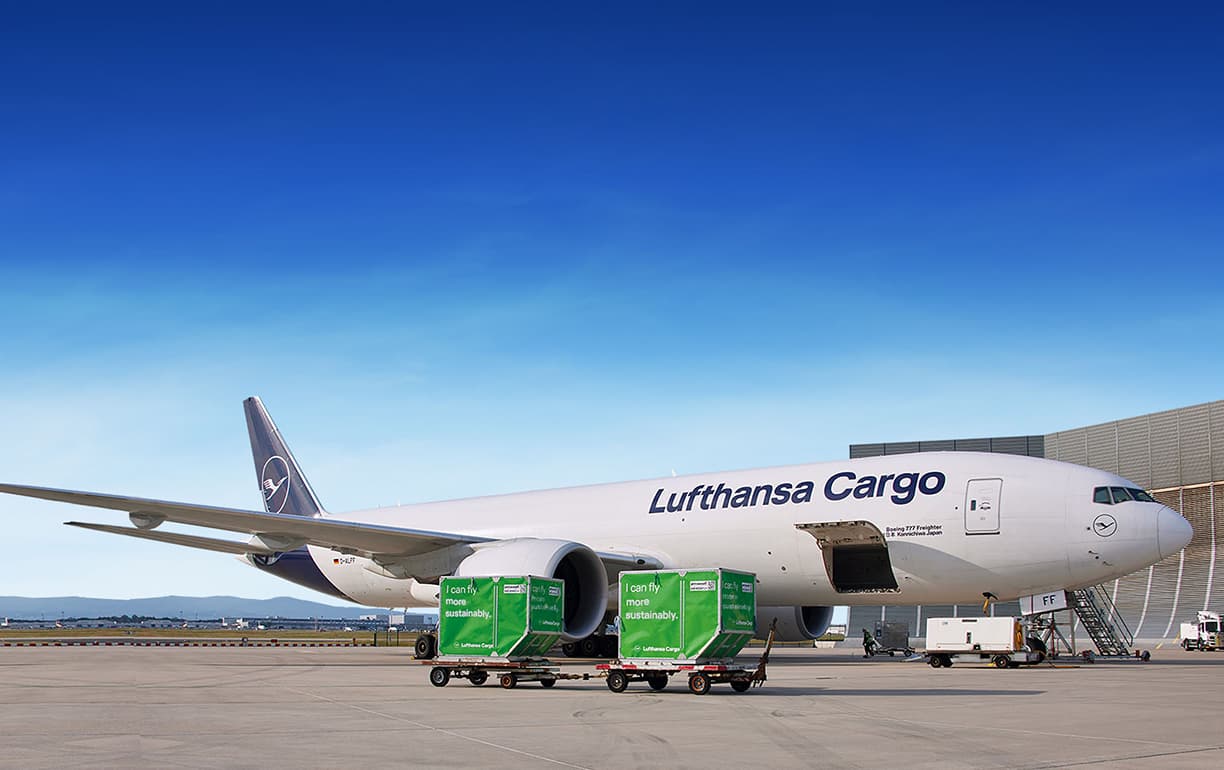
Depending on the time of year, the carbon footprint of fruit and vegetables can even be better if they are imported, as growing them in greenhouses or storing them for extended periods in cold stores causes more CO2 than transportation in some cases. However, this does not mean that not every opportunity to optimize should be considered. There are various ways of saving or offsetting emissions during transportation. "Lufthansa Cargo itself optimizes the reduction of its emissions through many measures, such as the use of AeroSHARK, lighter loading equipment and optimal flight route planning. For customers, there are two additional ways to contribute to the reduction of CO2 emissions. Firstly, by using Sustainable Aviation Fuel, and secondly, by offsetting remaining CO2 emissions through the contribution to high-quality climate protection projects," explains Nevine Saba, Commercial Manager at Lufthansa Cargo. She herself is involved in the production of SAF admittedly on a small scale. "We have an app in Egypt that we can use to collect our old cooking oil. These leftovers are then used for the production of SAF."
Venus International Transport also recognizes the importance of these measures. Samia El Sayed has been managing the leading exporter in Egypt since 1986 and appreciates the close cooperation with Lufthansa Cargo: "Airfreight is crucial for perishables, as they need to arrive at their destination as quickly as possible. Lufthansa Cargo is the perfect partner due to its network, its infrastructure such as the Perishable Center in Frankfurt and its reliability. With their Perishable toDoor service in Europe, they offer direct and temperature-controlled delivery to the recipient's warehouse, with the goods already checked and cleared through customs. This saves us the most important thing in this business: time." Another crucial factor when it comes to speed: a high-frequency network. Cairo currently has five weekly freighter connections to Frankfurt. On top of this, there are thirty weekly belly connections to Frankfurt, Munich, and Vienna.
In recent years, the entrepreneur, who is very well connected in her industry, has also focused on the most sustainable supply chain possible and relies on sustainable aviation fuel. "We already had 100% offset charters from Cairo to Frankfurt in 2022 and 2023. In 2024, we had two fully offset A321F charters with Sustainable Aviation Fuel. For me, Lufthansa Cargo is the leading provider in terms of sustainability in air freight," reports the logistics expert, who is known to everyone as "Madame Samia". The next generation is already integrated into the company at Venus International Transport. Vice Chairman Ahmed Fouad continues: "Globalization also means producing what you can do best under the given circumstances. And Egypt is a pioneer in agriculture. Air freight enables our farmers to be part of the global community and offer what we have perfected over hundreds and thousands of years. Lufthansa Cargo's purpose #EnablingGlobalBusiness is exactly in line with our idea of giving Egypt's innovative agricultural industry the chance to participate in the global market and make the most of global needs and local conditions."
|
Venus International Transport also recognizes the importance of these measures. Samia El Sayed has been managing the leading exporter in Egypt since 1986 and appreciates the close cooperation with Lufthansa Cargo: "Airfreight is crucial for perishables, as they need to arrive at their destination as quickly as possible. Lufthansa Cargo is the perfect partner due to its network, its infrastructure such as the Perishable Center in Frankfurt and its reliability. With their Perishable toDoor service in Europe, they offer direct and temperature-controlled delivery to the recipient's warehouse, with the goods already checked and cleared through customs. This saves us the most important thing in this business: time." Another crucial factor when it comes to speed: a high-frequency network. Cairo currently has five weekly freighter connections to Frankfurt. On top of this, there are thirty weekly belly connections to Frankfurt, Munich, and Vienna. |
In recent years, the entrepreneur, who is very well connected in her industry, has also focused on the most sustainable supply chain possible and relies on sustainable aviation fuel. "We already had 100% offset charters from Cairo to Frankfurt in 2022 and 2023. In 2024, we had two fully offset A321F charters with Sustainable Aviation Fuel. For me, Lufthansa Cargo is the leading provider in terms of sustainability in air freight," reports the logistics expert, who is known to everyone as "Madame Samia". The next generation is already integrated into the company at Venus International Transport. Vice Chairman Ahmed Fouad continues: "Globalization also means producing what you can do best under the given circumstances. And Egypt is a pioneer in agriculture. Air freight enables our farmers to be part of the global community and offer what we have perfected over hundreds and thousands of years. Lufthansa Cargo's purpose #EnablingGlobalBusiness is exactly in line with our idea of giving Egypt's innovative agricultural industry the chance to participate in the global market and make the most of global needs and local conditions." |
Find out more about our global network and our Perishable product.
Published 11/2024
Pictures: Luis Pedro Costa Gomes, Lufthansa Cargo
Find out more about our global network and our Perishable product.
Published 11/2024
Pictures: Luis Pedro Costa Gomes, Lufthansa Cargo

